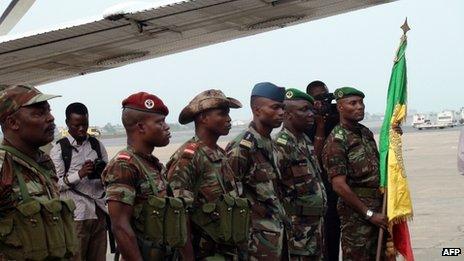France's Fabius says Africa 'must' send troops to Mali
- Published

West African leaders have been told they must "pick up the baton" in the military offensive to drive Islamist insurgents out of Mali.
French Foreign Minister Laurent Fabius said France had been obliged to send in troops "very, very rapidly otherwise there would be no more Mali".
But he has told a meeting in the Ivory Coast that the deployment of African soldiers is now a priority.
Ivory Coast President Alassane Ouattara also called for more support for Mali.
He said "the hour has come for a broader commitment by the major powers and more countries and organisations... to show greater solidarity with France and Africa in the total and multi-faceted war against terrorism in Mali".
France's Defence Minister Jean-Yves Le Drian said on Saturday that 2,000 troops were now on the ground in Mali, and the final total could top the 2,500 originally pledged.
The troops will stay in Mali for as long as necessary "to defeat terrorism" in West Africa, President Francois Hollande has said.
Islamist fighters on Friday withdrew from two towns in central Mali following French air strikes.
Officials say the Islamists have now left the southern town of Diabaly, which they took on Monday, while Mali's army has also recaptured Konna, which was seized by rebels triggering the French intervention.
Questions over foreign troops
Laurent Fabius said upon his arrival in the Ivorian capital Abidjan that it was time for the African nations to take over "as soon as possible".
"France was obliged to intervene very, very rapidly, otherwise there would have been no more Mali," he was quoted by the Agence France Presse as saying.
"But it is well understood that it is the Africans that must pick up the baton," he added.
Mr Fabius also confirmed that France would lead a European mission next month to help train and rebuild the Malian army.
He has urged Africa's international partners to help with logistical and financial support and said a donors' meeting in Addis Ababa at the end of the month would be crucial in addressing the needs of Mali and the region, the BBC's Thomas Fessy reports from Abidjan.
The first 100 troops of an African force - from Togo and Nigeria - landed in Mali's capital, Bamako, on Thursday.
They are being deployed under a UN Security Council resolution.
The original UN-backed strategy to reclaim northern Mali from Islamist rebels had France - among other Western powers - providing logistical support to an African-led force, adds our correspondent, but it is now clear that French troops will remain at the frontline of operations.
Nigeria will lead the West African force, with Chad, Benin, Ghana, Niger, Senegal, Burkina Faso and Togo also sending soldiers.
Nigeria says it will increase its forces to 1,200.
Chad has confirmed it will send 2,000 soldiers and it may also contribute its air force, considered one of the most effective on the continent.